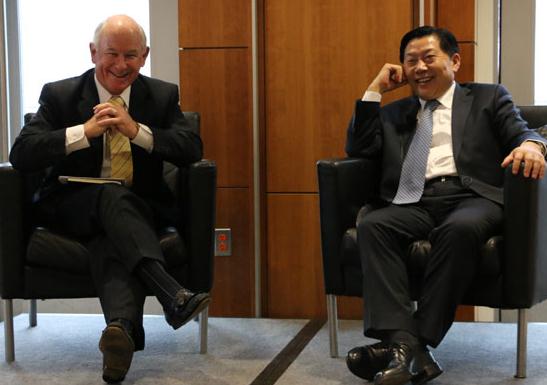

Lu Wei (right), minister of State Internet Information Office, talks to students and faculty at the George Washington University's Elliott School of International Affairs on Tuesday afternoon in a seminar moderated by Philip Crowley, the former US assistant secretary of state for public affairs who is now teaching at the George Washington University. Chen Weihua/China Daily
Chinese Internet regulation chief connects with US Ambassador Baucus
Lu Wei, head of the Chinese Internet regulator, and the US Ambassador to China Max Baucus are WeChat buddies.
And they will use the most popular instant messaging tool in the country to discuss the thorniest cyberissues the two countries face. It's unclear whether they'll use emojis - animated emoticons - in their chat threads. That might be a first in international diplomacy.
At a Chinese New Year reception held by the Cyberspace Administration Office of China, Lu told Baucus that he would welcome an exchange of views on Internet regulation via WeChat, a social networking tool developed by Tencent Holdings that boasts more than 400 million users worldwide.
"WeChat will be a very normal channel to exchange ideas for me and Baucus," Lu said. China is imposing tougher Internet regulatory policies because of fears an unfettered Internet could damage information security and social stability.
"The word 'net' also means law and order in Chinese culture. Every Internet user desires cyberfreedom, and order is the foundation," Lu said. "Where there is no order, there will be no freedom."
China and the United States have had a number of skirmishes over cybersecurity and Internet freedom. "I heard the message of cooperation from Lu," Baucus said. "I think we should focus more on the cooperation than on the differences." He agreed that both parties should keep the dialogue channels open and functioning.
The US, the creator of the Internet and a key overseer, is gradually losing control over the biggest innovation after electricity, as a number of countries are asking for an intergovernmental body to oversee the net.
Fadi Chehade, chief executive of the cyberspace governing body, the Internet Corporation for Assigned Names and Numbers, warned on Monday that hopes to transfer control of ICANN from US hands to a globally representative body could be jeopardized unless a deal is reached before the 2016 US presidential elections, Agence France-Presse reported.
China toughens cyber account naming control
2015-02-05China to regulate cyber accounts
2015-02-04New cyber rules take down more American TV shows
2015-01-22Tencent cracks down cyber crime
2015-01-21New institute to train cyber security talent
2015-01-09China, US to strengthen co-op on cyber issues
2014-12-04Copyright ©1999-2018
Chinanews.com. All rights reserved.
Reproduction in whole or in part without permission is prohibited.